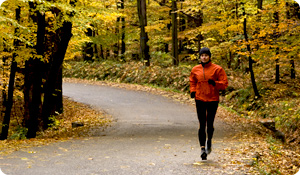
Do you like to run, play soccer, or ski? If you have asthma, you may find yourself avoiding activities like these as the weather gets colder. Fortunately, there are effective ways to protect your lungs from the strain of the bitter cold.
Air Temperature
As the temperature drops, the challenge to be active rises. This is because when you engage in normal activities, you usually breathe in through your nose, which warms and filters the air before sending it to your lungs. But during heavy exercise, you tend to breathe through your mouth, sending cold air directly to your sensitive bronchial tubes. This can cause wheezing, coughing, chest tightness, difficulty breathing, and shortness of breath.
Other Seasonal Triggers
For at least part of the fall, outdoor allergens like mold and ragweed are out in full force and if you have allergy-related asthma, this can trigger an asthma attack when you exercise outside. Colds, flus, and respiratory infections are also more common in the fall and winter seasons, which can also make you more susceptible to asthma complications when you exert yourself. This is why it's essential to be aware of how you feel when you exercise at this time of year.
Overcoming Exercise Asthma
Since exercise asthma in the fall and winter can be dangerous if left untreated, it's important to take your symptoms seriously. This doesn't mean you need to sit on the couch until spring, though. Many professional athletes and Olympic medalists have overcame their asthma and have excelled at their favorite sports, even in the late fall and winter seasons. For instance, pro football player Emmitt Smith, Olympic ice skating medalist Kristi Yamaguchi, and Olympic cross-country skiing medalist Bill Kock are just a few successful, well-known athletes who excelled despite having asthma.
Take Steps to Gain Control
Even though you might not win a professional football game or an Olympic medal, you can still manage your asthma and keep it from interfering with your exercise goals. Experts stress the importance of following your asthma action plan, using your control medication on a regular basis, and tracking your symptoms to stay on top of any changes to your condition.
Other things you can do to avoid exercise asthma include:
- Wearing a scarf over your nose and mouth to warm the air before it enters your bronchial tubes.
- Watching pollen count and ozone levels, since days when these are high can make it even more difficult to breathe outside.
- Allowing time to warm up your body before exercising and also plan to cool down at the end. (This helps reduce the strain on your lungs.)
- Taking it easy when you have a cold or respiratory infection, since your lungs could be more sensitive.
- Carrying your fast-acting relief inhaler with you in case you should need it.
Choose Wisely
It can also be helpful to select fall and winter sports that don't overtax your lungs. Walking, biking, hiking, and swimming can be good exercises for asthmatics. In addition, sports like baseball, football, and track and field are worth considering, since they require only small bursts of exertion and put less strain on your lungs (rather than the long-term endurance you would need for soccer, baseball, and skiing). With careful planning, you can participate in sports all year long and still breathe easy.
Source:
American Academy of Allergy, Asthma and Immunology (AAAAI)
http://www.aaaai.org/patients/allergy_asthma_issues/2009/winter/asthma_and_winter_sports.asp
American Association for Respiratory Care/Your Lung Health
http://www.yourlunghealth.org/healthy_living/aah/09.08/articles/athlete/
National Athletic Trainers Association





